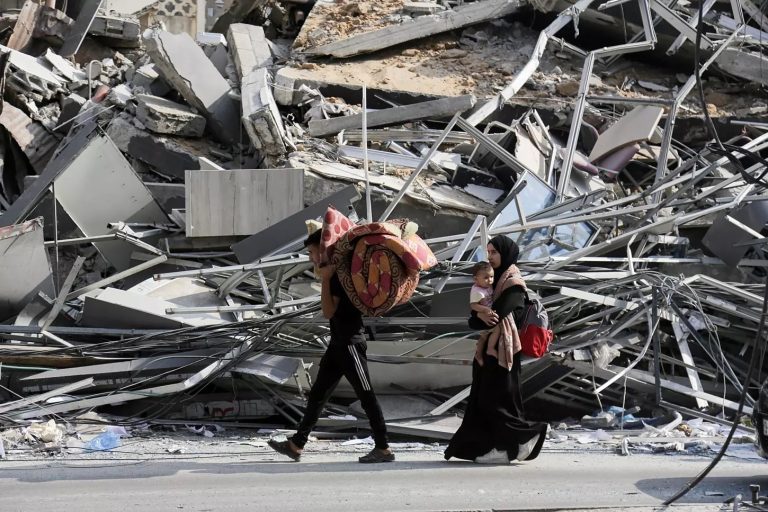4 de enero 2024

Children of Exile: The Births “Sowing Hope” in the Camp of Nicaraguan Farmers

PUBLICIDAD 1M
PUBLICIDAD 4D
PUBLICIDAD 5D
A clear majority rejects the two wars, in Ukraine and Gaza, but the positions of the great powers prevent progress in favor of peace

A family flees the northern part of the Gaza Strip, with what they can carry. Photo: EFE | Haitham Imad
The violent profile of this 21st century, which began with the demolition of the Twin Towers and the wars in Iraq and Afghanistan, is more clearly outlined in this year that is ending. 2023 ends with two terrible wars, one in Ukraine and the other in Gaza, and with the unstoppable advance of the deterioration of democracy globally and the consolidation of new despotisms.
Two years after the invasion of Ukraine, the Kremlin, after hinting at a possible diplomatic understanding, launched the largest air attack on Dnipro, Kharkiv, Zaporizhzhia, Odessa, Lviv and other Ukrainian cities. The bombings hit civilian infrastructure in cities located far from the border region, which Moscow supposedly claims.
Kyiv is located in the center of Ukrainian territory and Lviv is very close to the border with Poland. The radius of action of the missiles goes beyond the objective of annexing the Donbas regions, where secessionist republics were established. These actions reaffirm the dual purpose of the February 22, 2022 invasion: to incorporate most of Ukraine into Russia and to weaken the sovereign Ukrainian state as much as possible.
A terrorist attack by Hamas against Israel in early October unleashed another war in retaliation that will soon be three months old and, apparently, has no outcome in sight. Benjamin Netanyahu’s government has said it intends to “destroy Hamas,” which is equivalent to destroying the government of the Gaza Strip, which the terrorist group seized from the Palestinian Authority through parliamentary elections since 2006.
Those in Ukraine and Gaza are, therefore, two wars of a strong state against a weak one. Two wars that have become international, whose respective regional and global alliances beef up the theater of operations. In the face of the two conflicts, the international community reveals its deep geopolitical divisions. These international alignments ignore UN calls for a ceasefire or peace negotiations.
Voting at the UN has been very eloquent in both conflicts. A clear majority of the world rejects both wars, but the minority positions of the great powers, especially in the Security Council, and the commitment of those with each side, prevent the advancement of effective international actions in favor of peace.
The United States and much of Europe support Ukraine and Israel, although the European consensus is fragile in both conflicts. China does not recognize the authority of Hamas and does not fully sympathize with Putin’s war, but it avoids strong positions in each war. In the Middle East, where there was significant initial rejection of the Russian invasion, opposition to Israel’s offensive in Gaza is growing.
More or less that would also be the perspective of Latin America and the Caribbean. Most governments in the region opposed Putin’s war, with the exceptions of Cuba, Nicaragua, Venezuela, Bolivia, and El Salvador. That same majority also opposes Israel’s war in Gaza, although with other exceptions, such as Guatemala, Paraguay, Uruguay and Argentina, whose governments have voted against or abstained from resolutions demanding a ceasefire for humanitarian reasons.
Other powers, such as India, have had less predictable behavior in both conflicts. Prime Minister Narendra Modi, who holds the presidency of the G-20, was one of the most recognizable voices in favor of abstaining from UN resolutions against Russia, following the invasion of Ukraine. However, in the Gaza conflict, India remains on Israel’s side.
India’s position is explained by the Modi government’s internal conflict with Islamism and jihadism. Despite its peculiarity, this position illustrates very well the multipolar complexity of the 21st century, which some would like to split in two, as in the binary times of the Cold War.
*This article was originally published in La Razón, from Mexico.
This article was originally published in Spanish in Confidencial and translated by Havana Times

PUBLICIDAD 3M
Historiador y ensayista cubano, residente en México. Es licenciado en Filosofía y doctor en Historia. Profesor e investigador del Centro de Investigación y Docencia Económicas (CIDE) de la Ciudad de México y profesor visitante en las universidades de Princeton, Yale, Columbia y Austin. Es autor de más de veinte libros sobre América Latina, México y Cuba.
PUBLICIDAD 3D